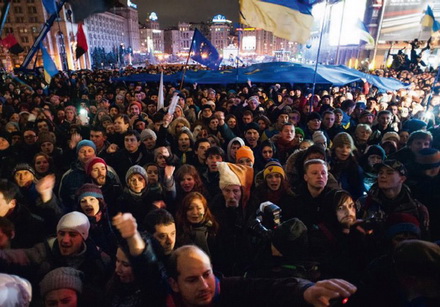This article was originally published on September 30, 2014 by the British Ukrainian Society, and concerns the 2013-2014 events of Euromaidan, a protest movement following the Ukrainian government’s decision to forgo signing the European-Ukraine Association Agreement and instead strengthen the country’s ties to Russia. In response to Russian attacks on Ukraine in 2022, The Civilians looks back on this moment and Natal’ya Vorozhbit’s play, MAIDAN, through this piece by Tina Nandha.
Learn how you can support Ukraine by visiting the British Ukrainian Society here.

News coverage of rapidly developing, historic events often struggles to accurately relate the experiences of individuals, but theatre can do just that. In an auditorium, an audience can watch a Maidan square protestor sense the beginning of a new order, while others form a community; and one decides that violence must be the only way to effect change. And so Ukraine’s 2013 revolution comes into a new level of focus.
When the protests against Viktor Yanukovych’s presidency started last November, playwright Natal’ya Vorozhbit felt that it was not enough for her to be there as a citizen, she wanted to contribute as an artist. In early December work began on Maidan: Voices from the Uprising, a verbatim play made of testimonies from protestors at Maidan, edited by Vorozhbit and the director Andrei Mai.
Video testimonies — 57 hours’ worth in total — were collected over three months from participants with diverse backgrounds, including students, doctors and Cossacks; people whose experiences have a common thread. They remember unity and, at times, disagreements. One man is infuriated by a once anti-Maidan doctor who climbs atop the bandwagon, only to behave as though he was always on board. A student is frustrated by people at her college who take no interest. Opinions of acquaintances who get their news from Russian television are repeated in a tone of baffled mockery.
Maidan came to London’s Royal Court Theatre in May, translated by Sasha Dugdale and directed by the theatre’s artistic director, Vicky Featherstone. At the time Vorozhbit explained the motivation behind the play: ‘Events in Ukraine had just started to develop,’ she said. ‘My theatre colleagues and I wanted to respond as a theatre community. Events were moving so fast, that each day was quickly forgotten about, so we decided to fix it.’ Their study of the people occupying the square was intended, she said, ‘to capture the reality, to challenge stereotypes and open people’s eyes to what is happening in Ukraine, as outside Ukraine there are so many misconceptions’.
Seeing the uprising unfold through the eyes of its participants, we see how developments impact and are perceived by those taking part. As they talk about work, partners, food — their lives — and we watch the escalation on a day-by-day, human-by-human basis, we get to know a group of people who have become revolutionaries and are many other things besides. A sense of immediacy is one of the play’s most valuable qualities. Yes, the passing of time and landmark events were signposted by the actors writing dates on the stage’s backdrop in the Royal Court performances, but the chief merit of Maidan is that it pulls the audience into individual lives as the events unfold.
After the play was performed in London Vorozhbit spoke about how significantly protestors’ views of life changed over the three-month period, as issues they had never had to confront before — concerning honour, death, the question of killing — became part of their daily existence.
‘After I had compiled all the interviews to put together this play, it was an incredible feeling to re-read the script of our lives,’ Vorozhbit has said. ‘The student who talks about having taken exams at drama school, but still doesn’t know that the police will beat him tomorrow. A housewife says that she is against any sort of violence, but still does not know that in a month she will be throwing Molotov cocktails and encouraging men to “kill” the riot police. We condemn the beating of a journalist, but we still don’t know that in a month we will be burying hundreds of people.’
In May Vorozhbit also explained the decision to present the testimonies verbatim: ‘If I wrote a play in 10 years’ time, I wouldn’t choose the genre of “verbatim”,’ she said. ‘In 10 years the testimonies from Maidan would no longer be alive and immediate. It would be analysis, feelings would have been reflected on and opinions formed. But right now, it is impossible to write an artistic interpretation of Maidan. Maidan isn’t over yet, we still can’t reflect on what is happening. It’s like not sewing up a patient after surgery and sending them home with an open wound. We can only scream about how much it hurts, and not about how we survived the operation and what caused the disease.’
Readings of Maidan were held in Ukraine, Moscow and Poland before it came to London, and further productions are planned. It is a genuinely illuminating piece of work, of a type that Vorozhbit feels would have helped her to understand the revolutions and wars of the past, which can seem like lists of events.
In her words, ‘All walks of life were on the square and we captured all the atmosphere, every feeling and emotion. There was an incredible energy as if we were all plugged into the mains. It was an incredibly hard winter, filled with pain, pride, horror, love — the most polar of emotions.’
Extended Play is a project of The Civilians. To learn more about The Civilians and to access exclusive discounts to shows, visit us and join our email list at TheCivilians.org.








